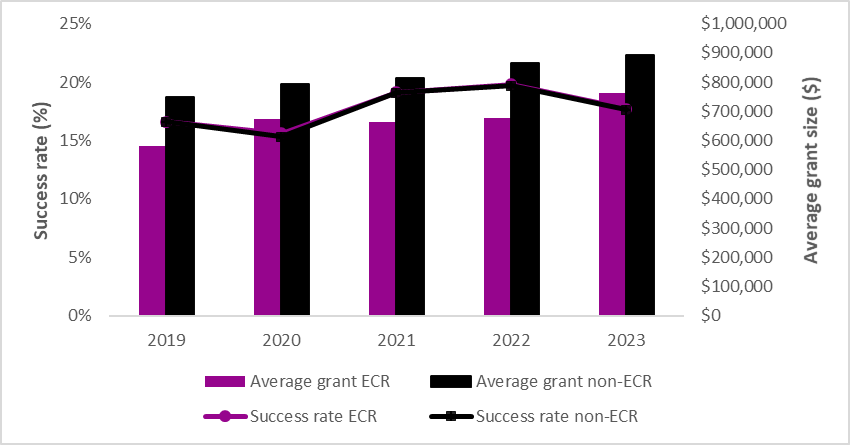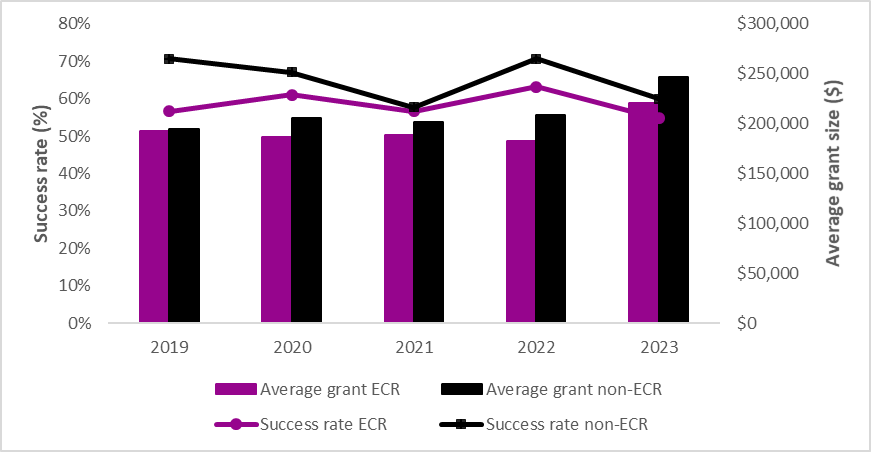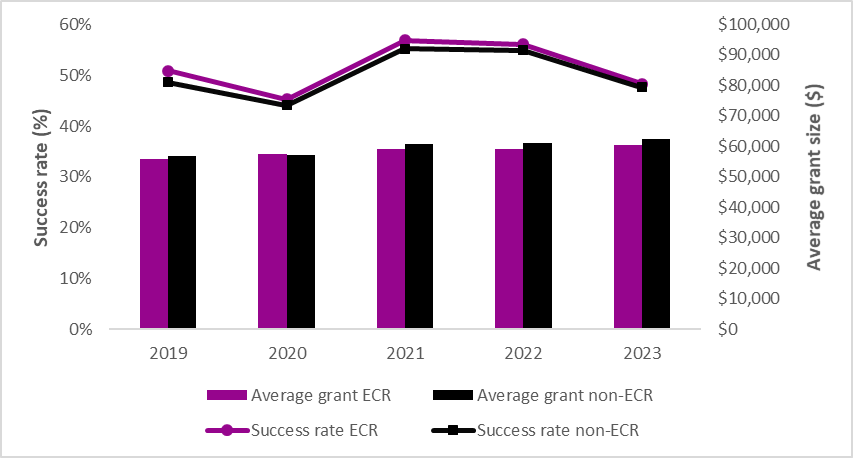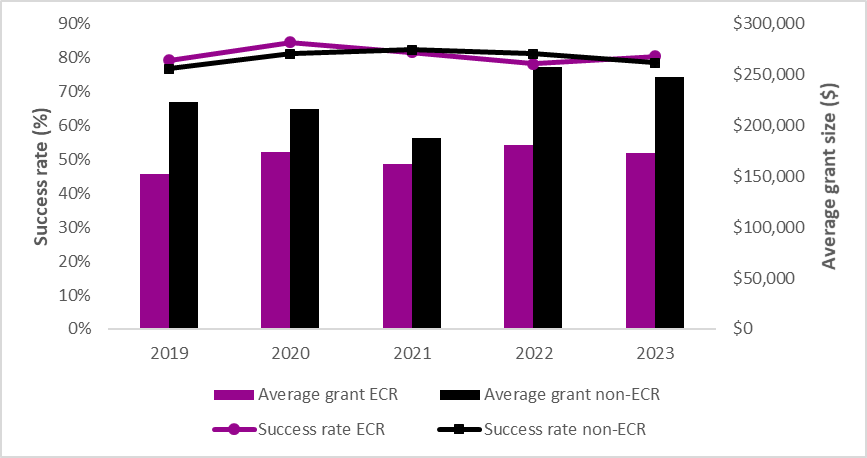Annex II: Early career researcher data for flagship investigator-initiated research grant competitions
Each agency has provided an update to last year’s report, providing data from the 2023 and 2024 competition years from their flagship investigator-initiated research programs, based on grant amounts committed at the time of offer. For earlier data, please see the Data Annexes from previous CRCC Progress Reports Publications.
Canadian Institutes of Health Research
Project Grants are designed to support people at any career stage to build and conduct health-related research and knowledge translation projects while capturing ideas with the greatest potential for important advances in fundamental or applied health-related knowledge, health care, health systems and/or health outcomes. There are two Project Grants competitions per year (spring and fall). Grant values and durations are proportionate to the requirements of the research proposed and vary depending on the research field, research approach and scope of project activities: they are not explicitly capped.
At CIHR, an early career researcher (ECR) has historically been one who, at the time of application, has held a full-time, independent research appointment for a period of up to five years (60 months), excluding leaves of absence. ECR status was validated only for Project Grant competitions. Within the overall competition budget, there is a specific funding envelope to ensure the proportion of grants going to ECRs is at least equal to the proportion of applications submitted by ECRs. Competition processes and peer review for this cohort are fully integrated in the entire competition, with no additional steps required on the part of applicants.
Figure 1: Canadian Institutes of Health Research success rates (lines) and average grant sizes (bars) for early career researchers and non-early career (established) researchers for the Project Grants from 2019 to 2023

Description of Figure 1
Using a line graph and a vertical bar graph, this figure shows CIHR’s success rates and average grant sizes for early career researchers (ECRs) and established researchers for the Project Grants program, from 2019 to 2023. The first y-axis, to the left side, shows the success rates, in percentages, from 0 to 25%. The second y-axis, to the right side, shows the average grant sizes, in dollars, from $0 to $1,000,000. The x-axis lists each year from 2019 to 2023.
CIHR’s success rates and average grant sizes for ECRs and for established researchers for the Project Grants program, from 2019 to 2023, were as follows:
- In 2019, the success rate was 16.6% for both early career and established researchers. The average grant size was $581,139 for ECRs and $750,253 for established researchers.
- In 2020, the success rate was 15.6% for ECRs and 15.3% for established researchers. The average grant size was $673,052 for ECRs and $792,275 for established researchers.
- In 2021, the success rate was 19.1% for both early career and established researchers. The average grant size was $663,380 for ECRs and $813,471 for established researchers.
- In 2022, the success rate was 19.8% for ECRs and 19.7% for established researchers. The average grant size was $676,640 for ECRs and $866,234 for established researchers.
- In 2023, the success rate was 17.7% for ECRs and 17.6% for established researchers. The average grant size was $763,218 for ECRs and $893,276 for established researchers.
| Project Grants | 2019 | 2020 | 2021 | 2022 | 2023 |
|---|---|---|---|---|---|
| Number of applications—ECRs | 1,016 | 1,121 | 1,139 | 1,091 | 1,101 |
| Number of applications—total | 4,629 | 4,489 | 4,395 | 3,994 | 4,290 |
| % of all applications | 21.9% | 25.0% | 25.9% | 27.3% | 25.7% |
| Success rate—ECRs | 16.6% | 15.6% | 19.1% | 19.8% | 17.7% |
| Success rate—established researchers | 16.6% | 15.3% | 19.1% | 19.7% | 17.6% |
| Average grant—ECRs | $581,139 | $673,052 | $663,380 | $676,640 | $763,218 |
| Average grant—established researchers | $750,253 | $792,275 | $813,471 | $866,234 | $893,276 |
| Total Project Grant program funds awarded—ECRs | $98,212,527 | $117,784,111 | $144,616,856 | $146,154,293 | $148,827,429 |
| Total Project Grant funds awarded | $547,613,842 | $526,597,846 | $649,782,320 | $640,774,125 | $650,848,708 |
| % of funds to ECRs | 17.9% | 22.4% | 22.3% | 22.8% | 22.9% |
| Average grant (per year of grant)—ECRs | $140,158 | $155,533 | $152,109 | $157,370 | $174,157 |
| Average grant (per year of grant)—established researchers | $166,980 | $174,951 | $179,988 | $188,533 | $198,563 |
| Total Project Grant program funds awarded—ECRs (per year of grant) | $23,686,639 | $27,218,346 | $33,159,544 | $33,992,000 | $33,960,570 |
| Total Project Grant program funds awarded (per year of grant) | $123,707,806 | $117,492,829 | $144,932,544 | $141,644,083 | $145,552,907 |
| % of funds to ECRs | 19.1% | 23.2% | 22.9% | 24.0% | 23.3% |
Natural Sciences and Engineering Research Council
NSERC Discovery Grants support ongoing programs of research with long-term goals rather than a single, short-term project or collection of projects. Discovery Grants are five-year grants. There is one Discovery Grants competition per year. Individuals can apply for and hold only one Discovery Grant at a time. Discovery Grant holders cannot reapply for another until the last year of their current award.
Individuals submitting an application are categorized as either ECRs or established researchers. Starting in 2019, ECRs are defined as people within five years of the start date of their first eligible position at a university with no prior academic or non-academic independent research experience. In all years reported, the window for being considered an ECR could be adjusted to include instances when they had an eligible delay in research (owing to illness, parental leave, etc.).
Applications from ECRs are evaluated against the same three selection criteria as established researchers; however, it is recognized that individuals applying early in their career may not have had the opportunity to make the same levels of contribution to research and training as established researchers. NSERC implements a different quality cut-off for funding ECRs and offers additional sources of support to those awarded a Discovery Grant to ensure the proportion of grants going to ECRs is similar to the proportion of applications submitted by ECRs. These include:
- the Discovery Launch Supplement, introduced in 2018, a one-time award valued at $12,500; and
- ECRs are offered an additional year of funding on their existing Discovery Grant at the same level.
Competition processes and peer review for this cohort are fully integrated in the entire competition, with no additional steps required on the part of applicants.
Figure 2: Natural Sciences and Engineering Research Council success rates (lines) and average grant sizes (bars) for early career researchers and non-early career (established) researchers for Discovery Grants from 2019 to 2023

Description of Figure 2
Using a line graph and a vertical bar graph, this figure shows NSERC’s Discovery Grants success rates and average grant sizes for early career researchers (ECRs) and established researchers from 2019 to 2023. The first y-axis, to the left side, shows the success rates, in percentages, from 0 to 80%. The second y-axis, to the right side, shows the average grant sizes, in dollars, from $0 to $300,000. The x-axis lists each year from 2019 to 2023.
NSERC’s Discovery Grants success rates and average grant sizes, from 2019 to 2023, for ECRs and for established researchers, were as follows:
- In 2019, the success rate was 56.6% for ECRs and 70.6% for established researchers. The average grant size was $192,549 for ECRs and $194,672 for established researchers.
- In 2020, the success rate was 61.1% for ECRs and 67.1% for established researchers. The average grant size was $186,540 for ECRs and $205,158 for established researchers.
- In 2021, the success rate was 56.6% for ECRs and 57.7% for established researchers. The average grant size was $188,798 for ECRs and $201,134 for established researchers.
- In 2022, the success rate was 63.2% for ECRs and 70.6% for established researchers. The average grant size was $182,804 for ECRs and $208,830 for established researchers.
- In 2023, the success rate was 54.7% for ECRs and 60.0% for established researchers. The average grant size was $220,366 for ECRs and $246,224 for established researchers.
| Discovery Grants | 2019 | 2020 | 2021 | 2022 | 2023 |
|---|---|---|---|---|---|
| Number of applications—ECRs | 882 | 889 | 866 | 837 | 868 |
| Number of applications—total | 3,404 | 3,372 | 2,008 | 2,518 | 2,802 |
| % of all applications | 25.9% | 26.4% | 43.1% | 33.2% | 31.0% |
| Success rate—ECRs | 56.6% | 61.1% | 56.6% | 63.2% | 54.7% |
| Success rate—established researchers | 70.6% | 67.1% | 57.7% | 70.6% | 60.0% |
| Average grant—ECRs | $192,549 | $186,540 | $188,798 | $182,804 | $220,366 |
| Average grant—established researchers | $194,672 | $205,158 | $201,134 | $208,830 | $246,224 |
| Total Discovery Grants funds awarded—ECRs | $96,081,926 | $101,291,334 | $92,510,996 | $96,703,082 | $104,673,800 |
| Total Discovery Grants funds awarded | $442,598,291 | $443,084,989 | $225,058,041 | $344,375,947 | $390,293,155 |
| % of funds to ECRs | 21.7% | 22.9% | 41.1% | 28.1% | 26.8% |
| Average grant (per year of grant)—ECRs | $32,508 | $31,509 | $31,883 | $30,884 | $37,144 |
| Average grant (per year of grant)—established researchers | $40,071 | $41,032 | $40,227 | $41,766 | $49,245 |
| Total Discovery Grants funds awarded—ECRs (first year of grant) | $16,221,571 | $17,108,139 | $15,622,666 | $16,337,597 | $17,643,550 |
| Total Discovery Grants funds awarded (first year of grant) | $87,547,244 | $85,466,870 | $42,132,075 | $65,872,170 | $74,767,421 |
| % of funds to ECRs | 18.5% | 20.0% | 37.1% | 24.8% | 23.6% |
Social Sciences and Humanities Research Council
Insight Development Grants support the development of new research in its initial stages. Applications are project based and may be submitted by individual researchers or research teams. Insight Development Grants are valued at up to $75,000 over one to two years.
Within the Insight Development Grants funding opportunity, funding is available for two distinct categories of scholars: emerging scholars and established scholars. Emerging scholars may submit projects that build on and further the applicant’s (or team’s) graduate work and/or represent a continuation of their overall research trajectory. Applications by established scholars must explore new research questions and/or approaches that are distinct from the applicant’s previous/ongoing research. Emerging scholar status is validated for Insight Development Grants and at least 50% of funds are reserved for applications from emerging scholars. The emerging scholar category is used as a proxy for ECRs within the Insight Development Grants funding opportunity.
To be validated as an emerging scholar within Insight Development Grants, applicants must demonstrate that they have not successfully applied, as principal investigator or project director, for a grant offered through SSHRC, NSERC or CIHR. In addition, they must meet at least one of the following criteria:
- have completed their highest degree no more than six years before the competition deadline (SSHRC considers only the date of completion of the first doctorate);
- have held a tenured or tenure-track postsecondary appointment for less than six years;
- have held a postsecondary appointment, but never a tenure-track position (in the case of institutions that offer tenure-track positions); or
- have had their careers significantly interrupted or delayed for health or family reasons within the past six years.
Insight Grants support long-term, investigator-driven research excellence in the social sciences and humanities. Applications are project based and may be submitted by individual researchers or research teams. Insight Grants are valued at $7,000 to $100,000 per year over two to five years, up to a total of $400,000. Two funding streams are available, depending on the scale of the proposed project:
- Stream A for requests between $7,000 to $100,000; and
- Stream B for requests between $100,000 to $400,000.
Insight Grants are available to both emerging and established scholars. There is no reserved budget envelope for emerging scholars within Insight Grants, as the Insight Development Grants’ emerging scholars stream serves this purpose. Neither emerging scholar nor ECR status is validated within the scope of the Insight Grants funding opportunity. Instead, a proxy is used to identify ECRs. Applicants who have completed their first highest degree no more than six years before the competition deadline are identified as ECRs.
Figure 3: Social Sciences and Humanities Research Council success rates (lines) and average grant sizes (bars) for early career researchers and non-early career (established) researchers for Insight Development Grants from 2019 to 2023

Description of Figure 3
Using a line graph and a vertical bar graph, this figure shows SSHRC’s Insight Development Grants success rates and average grant sizes for early career researchers (ECRs) and established researchers from 2019 to 2023. The first y-axis, to the left side, shows the success rate, in percentages, from 0 to 60%. The second y-axis, to the right side, shows the average grant sizes, in dollars, from $0 to $100,000. The x-axis lists each year from 2019 to 2023.
SSHRC’s Insight Development Grant success rates and average grant sizes, from 2019 to 2023, for ECRs and for established researchers, were as follows:
- In 2019, the success rate was 50.9% for ECRs and 48.6% for established researchers. The average grant size was $55,694 for ECRs and $56,849 for established researchers.
- In 2020, the success rate was 45.3% for ECRs and 44.1% for established researchers. The average grant size was $57,567 for ECRs and $57,050 for established researchers.
- In 2021, the success rate was 56.9% for ECRs and 55.2% for established researchers. The average grant size was $59,089 for ECRs and $60,776 for established researchers.
- In 2022, the success rate was 56.1% for ECRs and 54.9% for established researchers. The average grant size was $59,193 for ECRs and $61,053 for established researchers.
- In 2023, the success rate was 48.3% for ECRs and 47.7% for established researchers. The average grant size was $60,548 for ECRs and $62,495 for established researchers.
| Overall | 2019 | 2020 | 2021 | 2022 | 2023 |
|---|---|---|---|---|---|
| Number of applications—ECRs | 884 | 960 | 905 | 791 | 913 |
| Number of applications—total | 2,493 | 2,681 | 2,288 | 2,138 | 2,347 |
| % of all applications | 35.5% | 35.8% | 37.9% | 37.0% | 38.9% |
| Total Insight Development Grants / Insight Grants funds awarded—ECRs | $29,049,725 | $30,550,140 | $36,237,645 | $34,713,561 | $31,001,962 |
| Total Insight Development Grants / Insight Grants funds awarded | $122,615,958 | $129,715,263 | $143,453,836 | $131,503,792 | $124,881,364 |
| % of funds to ECRs | 23.7% | 23.6% | 25.3% | 26.4% | 24.8% |
| Insight Development Grants | |||||
| Number of applications—ECRs | 739 | 782 | 751 | 658 | 756 |
| Number of applications—total | 1,128 | 1,256 | 1,175 | 1,055 | 1,203 |
| % of all applications | 65.5% | 62.3% | 63.9% | 62.4% | 62.8% |
| Success rate—ECRs | 50.9% | 45.3% | 56.9% | 56.1% | 48.3% |
| Success rate—established researchers | 48.6% | 44.1% | 55.2% | 54.9% | 47.7% |
| Average grant—ECRs | $55,694 | $57,567 | $59,089 | $59,193 | $60,548 |
| Average grant—established researchers | $56,849 | $57,050 | $60,776 | $61,053 | $62,495 |
| Total funds awarded—ECRs | $20,940,988 | $20,378,648 | $25,231,168 | $21,842,324 | $22,099,871 |
| Total Insight Development Grants funds awarded | $31,685,401 | $32,302,006 | $39,452,804 | $35,151,966 | $35,411,343 |
| % of funds to ECRs | 66.1% | 63.1% | 64.0% | 62.1% | 62.4% |
| Average grant (per year of grant)—ECRs | $27,950 | $28,995 | $29,787 | $30,077 | $30,735 |
| Average grant (per year of grant)—established researchers | $29,482 | $28,805 | $31,188 | $30,873 | $31,556 |
| Total funds awarded—ECRs (per average duration of grant) | $10,512,432 | $10,232,683 | $12,674,951 | $11,040,846 | $11,172,372 |
| Total Insight Development Grants funds awarded (per average duration of grant) | $15,984,153 | $16,237,526 | $19,891,917 | $17,757,491 | $17,860,171 |
| % of funds to ECRs | 66.1% | 63.1% | 64.0% | 62.1% | 62.4% |
| Insight Grants | |||||
| Number of applications—ECRs | 145 | 178 | 154 | 133 | 157 |
| Number of applications—total | 1,365 | 1,425 | 1,213 | 1,083 | 1,144 |
| % of all applications | 10.6% | 12.5% | 12.7% | 12.3% | 13.7% |
| Success rate—ECRs | 43.4% | 41.0% | 48.1% | 54.1% | 37.6% |
| Success rate—established researchers | 46.1% | 44.2% | 53.2% | 51.3% | 45.7% |
| Average grant—ECRs | $128,710 | $139,336 | $148,736 | $178,767 | $150,883 |
| Average grant—established researchers | $147,108 | $158,334 | $165,177 | $171,418 | $178,643 |
| Total funds awarded—ECRs | $8,108,737 | $10,171,492 | $11,006,477 | $12,871,237 | $8,902,091 |
| Total Insight Grants funds awarded | $90,930,557 | $97,413,257 | $104,001,032 | $96,351,826 | $89,470,021 |
| % of funds to ECRs | 8.9% | 10.4% | 10.6% | 13.4% | 9.9% |
| Average grant (per year of grant)—ECRs | $34,498 | $37,947 | $40,403 | $44,898 | $40,868 |
| Average grant (per year of grant)—established researchers | $37,422 | $40,267 | $41,296 | $42,573 | $43,873 |
| Total funds awarded—ECRs (per average duration of grant) | $2,155,487 | $2,719,850 | $2,961,743 | $3,286,273 | $2,477,469 |
| Total Insight Grants funds awarded (per average duration of grant) | $23,338,470 | $24,729,810 | $26,425,472 | $24,305,357 | $22,345,598 |
| % of funds to ECRs | 8.7% | 10.4% | 10.6% | 13.4% | 9.9% |
Canada Foundation for Innovation
The John R. Evans Leaders Fund (JELF) is designed to help institutions attract and retain the best people by providing them with the research infrastructure needed to be or become leaders in their field. The JELF also offers institutions the opportunity to create competitive research support packages in the form of infrastructure and a portion of the operating and maintenance costs, coupled with direct research support from partner organizations (Canada Research Chairs Program, Canada Excellence Research Chairs Program, NSERC and SSHRC).
Canadian universities, affiliated research hospitals and research institutes recognized as eligible by the CFI can apply for the JELF. The Small Institution Fund (SIF), which is part of the JELF, was created for institutions whose dedicated JELF allocation would be calculated as less than $800,000. Each SIF-eligible institution can draw from this fund to a maximum of $400,000 or $800,000, depending on their share of three federal research tri-agency funding.
Research community members listed on the proposal must be:
- recognized innovative leaders or have demonstrated the potential for excellence in the proposed research field;
- engaged in or embarking on research or technology development that is innovative, high quality and meets international standards; and
- current faculty members with full-time academic appointments or candidates that the university is in the process of recruiting to full-time academic positions in a strategic sector.
Figure 4: CFI success rates (lines) and average grant sizes (bars) for early career researchers and non-early career (established) researchers for the John R. Evans Leaders Fund from 2019 to 2023 (FY of award)

Description of Figure 4
Using a line graph and a vertical bar graph, this figure shows the CFI’s success rates and average grant sizes, from 2019 to 2023, for early career researchers (ECRs) and established researchers, for the John R. Evans Leaders Fund. The first y-axis, to the left side, shows the success rates, in percentages, from 0 to 90%. The second y-axis, to the right side, shows the average grant sizes, in dollars, from $0 to $300,000. The x-axis lists each year from 2019 to 2023.
The John R. Evans Leaders Fund success rates and average grant sizes from 2019 to 2023 for ECRs and for established researchers are as follows:
- In 2019, the success rate was 79.3% for ECRs and 76.7% for established researchers. The average grant size was $151,889 for ECRs and $223,418 for established researchers.
- In 2020, the success rate was 84.6% for ECRs and 81.2% for established researchers. The average grant size was $174,267 for ECRs and $216,270 for established researchers.
- In 2021, the success rate was 81.7% for ECRs and 82.4% for established researchers. The average grant size was $162,407 for ECRs and $187,337 for established researchers.
- In 2022, the success rate was 78.3% for ECRs and 81.2% for established researchers. The average grant size was $180,646 for ECRs and $257,877 for established researchers.
- In 2023, the success rate was 80.5% for ECRs and 78.6% for established researchers. The average grant size was $173,346 for ECRs and $248,065 for established researchers.
| John R. Evans Leaders Fund | 2019 | 2020 | 2021 | 2022 | 2023 |
|---|---|---|---|---|---|
| Number of applications—ECRsFootnote * | 334 | 273 | 300 | 327 | 256 |
| Number of applications—totalsFootnote ** | 665 | 464 | 522 | 614 | 424 |
| % of all applications | 50.2% | 58.8% | 57.5% | 53.3% | 60.4% |
| Success rate—ECRs | 79.3% | 84.6% | 81.7% | 78.3% | 80.5% |
| Success rate—established researchers | 76.7% | 81.2% | 82.4% | 81.2% | 78.6% |
| Average grant—ECRs | $151,889 | $174,267 | $162,407 | $180,646 | $173,346 |
| Average grant—established researchers | $223,418 | $216,270 | $187,337 | $257,877 | $248,065 |
| Total John R. Evans Leaders Fund funds awarded—ECRs | $40,250,531 | $40,255,643 | $39,789,797 | $46,245,309 | $35,709,356 |
| Total John R. Evans Leaders Fund funds awarded | $96,998,760 | $73,777,455 | $74,072,384 | $106,330,609 | $68,453,998 |
| % of funds to ECRs | 41.5% | 54.6% | 53.7% | 43.5% | 52.2% |